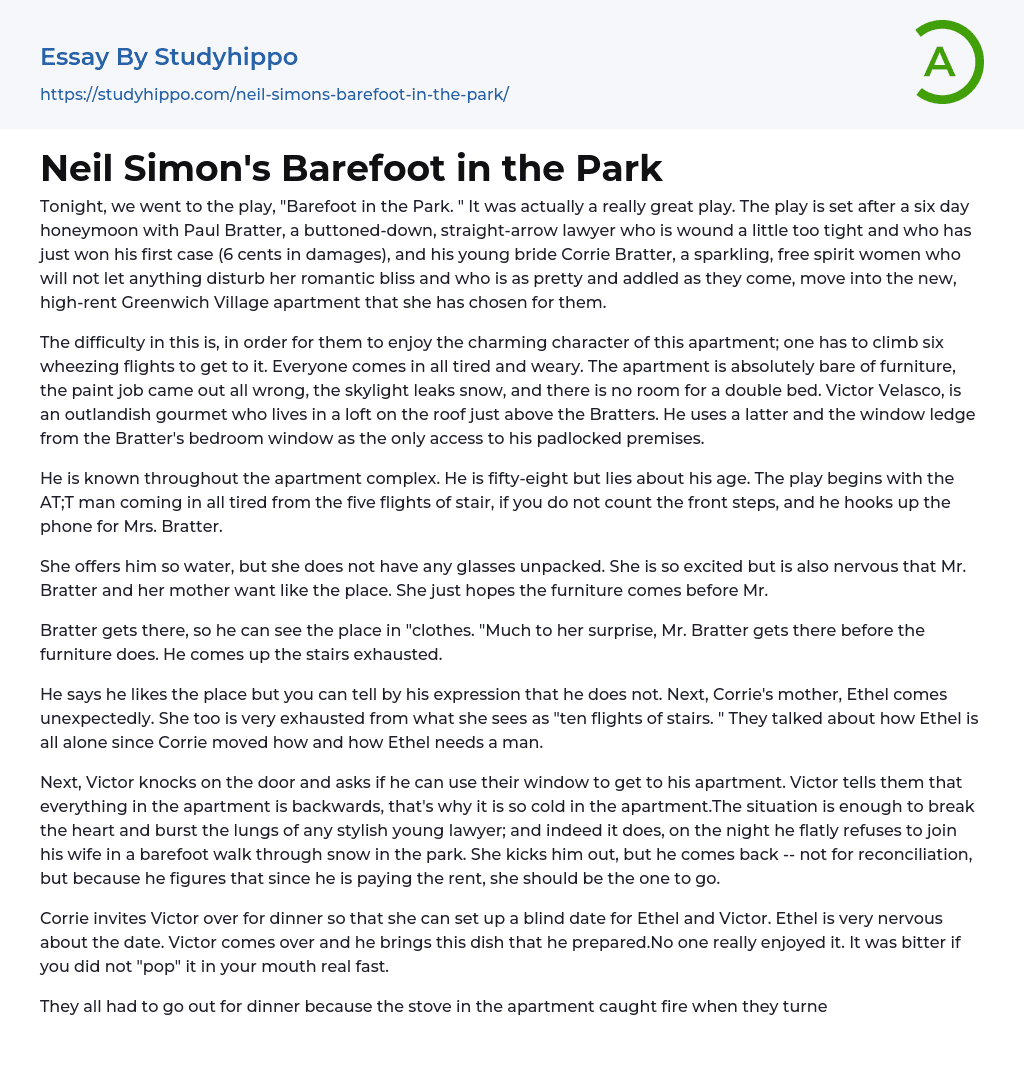Tonight, we saw "Barefoot in the Park," which we thought was a fantastic play. The story takes place after newlyweds Paul Bratter, a tight-laced lawyer, and his carefree wife Corrie move into their expensive Greenwich Village apartment following their six-day honeymoon. Despite their differing personalities, they try to make it work in their new home.
The challenge lies in accessing and appreciating the appealing qualities of this apartment, as it requires ascending six arduous flights of stairs. Visitors arrive fatigued and exhausted. The dwelling lacks furnishings, suffers from a flawed paint job, and endures a leaky skylight, leaving no space for a queen-sized bed. Victor Velasco is a peculiar epicurean residing in a rooftop loft which sits directly above the Bratters' abode. He utilizes a ladder and the Bratters' bedroom window ledge as his sole points of
...entry to his securely locked dwelling.
Despite being fifty-eight, he is famous in the apartment complex for his age deception. The play's opening scene depicts the AT;T man arriving, exhausted from climbing five flights of stairs (excluding the front steps), as he connects Mrs. Bratter's phone.
Although she is eager to offer him water, she finds herself without any unpacked glasses. Her excitement and nerves stem from hoping that both Mr. Bratter and her mother approve of the place. She simply wishes for the furniture to arrive before his visit.
Arriving at the location, Bratter is able to assess it while wearing appropriate attire. To her astonishment, the furniture has yet to arrive but Mr. Bratter has already made it up the stairs and is feeling fatigued.
Although he claims to enjoy the location, it is evident from his facial expression that
he is not pleased. Shortly afterwards, Corrie's mother, Ethel, arrives unexpectedly, exhausted from what she perceives as "climbing ten flights of stairs". They discuss Ethel's loneliness since Corrie departed, and how she requires a companion.
Victor comes to the door and asks to use their window to get to his apartment, explaining that everything is backwards there and making it cold. This heartbreaking situation causes a young lawyer to refuse a walk with his wife in the snow, leading to her kicking him out. However, he later returns not for reconciliation, but because he believes that since he pays the rent, she should be the one to leave.
Corrie arranges for Victor to come over for dinner in order to introduce him to Ethel on a blind date. Ethel is anxious about the upcoming date. Victor brings a dish that he made, but unfortunately, it is not well-received. The food has a bitter taste unless it is quickly consumed.
Due to the stove catching fire when turned on, everyone had to leave the apartment and go out for dinner. They ended up at a place with unpleasant food. Later, Corrie and Victor arrived back first along with Paul carrying Ethel. Corrie demanded that Victor drive Ethel home despite the thirty minute distance, leading to an argument between her and Paul.
Corrie and her partner had a heated conversation where she expressed her wish for a divorce due to their lack of commonalities. She was upset with him because he would not walk barefoot in the park with her when it was 17 degrees, leading to him sleeping on the couch. The next day, Corrie's aunt called saying Ethel had
not come home. In response, Corrie demanded that Paul leave before she returned.
Upon her return, Ethel joined Corrie, but only partially dressed, as the night before she had gotten inebriated with Victor and needed assistance to get to his room. Victor, also intoxicated, informed Corrie that he was staying and that she must leave because he was the one paying rent. In a dramatic conclusion, Victor ventured onto the window ledge but grew frightened and was ultimately saved by Corrie.
The play was immensely enjoyable, featuring impeccable performances by a talented cast and leaving me thoroughly amused. I wholeheartedly recommend this play to anyone seeking a good time. Many thanks to OSP for the opportunity to experience yet another fantastic play!
- Hamlet essays
- Iago essays
- Macbeth essays
- Othello essays
- The Merchant Of Venice essays
- A raisin in the sun essays
- The glass menagerie essays
- Hedda Gabler essays
- Oedipus The King essays
- Oedipus Rex essays
- Twelfth Night essays
- Much ado about nothing essays
- King Lear essays
- The Taming of The Shrew essays
- A Doll's House essays
- Waiting For Godot essays
- A Midsummer Night's Dream essays
- Romeo And Juliet essays
- An Inspector Calls essays
- The Importance of Being Earnest essays
- Pygmalion essays
- A Streetcar Named Desire essays
- Tartuffe essays
- Death of a salesman essays
- Fences essays
- Everyman essays
- Prince Hamlet essays
- Hamlet Madness essays
- Banquo essays
- Macbeth Ambition essays
- Othello Jealousy essays
- Mercutio essays
- American Literature essays
- Between The World and Me essays
- Book Report essays
- Book Review essays
- Book Summary essays
- Books essays
- Character essays
- Coming of Age essays
- Dante's Inferno essays
- Everyday Use essays
- Flowers for Algernon essays
- Genre essays
- Greek Mythology essays
- Incidents in The Life of a Slave Girl essays
- Letter essays
- Literary Criticism essays
- Literary devices essays
- Literature Review essays




